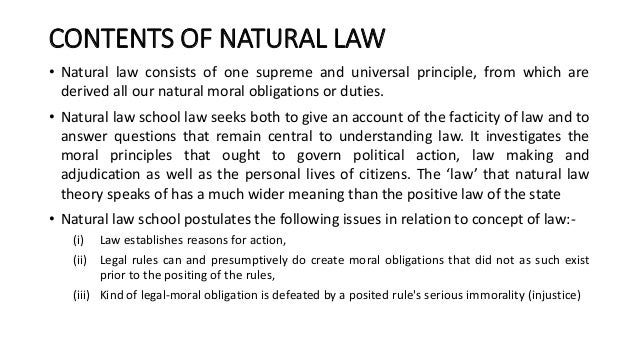Natural moral law is an absolutist theory that was developed by Thomas Aquinas a priest and prominent theologian in the early Church and uses the natural order of the world as its basis. Human beings are not.
Natural law is a foundation for moral and civil law.
/GettyImages-117706269-47c77a697479491ca3680eebcd74dcb6.jpg)
Define natural moral law. Natural law is common to all the nations. See also nomological 2 3. That just laws are immanent in nature.
That is they can be discovered or found but not created by such things as. That they can emerge by the natural process of resolving conflicts as embodied by the evolutionary process of. For some people moral law is synonymous with the commands of a divine being.
Hence the idolatry of say Hinduism is banned under natural law. Evil is a cause of human suffering. Morality relates to what is right and wrong and what is good and bad.
Natural Law Natural law theory holds that all human conduct is governed by an inherited set of universal moral rules. The purpose of ethical theories are to. Natural Law The unwritten body of universal moral principles that underlie the ethical and legal norms by which human conduct is sometimes evaluated and governed.
Moral evil and natural suffering Evil. Natural law holds that there are universal moral standards that are inherent in humankind throughout all time and these standards should form the basis of a just society. Natural Law is an absolutist theory most commonly associated with St Thomas Aquinas 1224 -1274.
Law is not about individual morality. These rules apply to everyone everywhere in the same way. For others moral law is a set of universal rules that should apply to everyone.
It relies on Aquinas basic understanding that humans innately try to do good and to avoid evil in order to find fulfilment and happiness in life Synderesis Rule. Natural law theory is a label that has been applied to theories of ethics theories of politics theories of civil law and theories of religious morality. In jurisprudence natural law can refer to the several doctrines.
Philosophy a nonlogically necessary truth. This means that the testimony of natural law leads one to have a true religion. Natural law in philosophy a system of right or justice held to be common to all humans and derived from nature rather than from the rules of society or positive law.
These guidelines may or may not be part of a religion codified in written form or legally enforceable. During most of the 20th century most secular moral philosophers considered natural law ethics to be a lifeless medieval relic preserved. Moral evil the acts of humans which are considered to be morally wrong eg murder and.
Natural law is opposed to positive law which is determined by humans conditioned by history and subject to continuous change. It doesnt matter if youre a Christian Muslim Jew Hindu Buddhist Daoist animistnatural law applies to you. Thomas Aquinas would say that natural law in the heart of man would argue against idolatry polytheism atheism etc.
Natural law is often contrasted with positive law which consists of the written rules and regulations enacted by government. Thomas Aquinas developed an ethical theory known as Natural Law. Natural law theory is a legal theory that recognizes law and morality as deeply connected if not one and the same.
Moral law is a system of guidelines for behavior. There are two types of evil. Natural law is the philosophy that certain rights moral values and responsibilities are inherent in human nature and that those rights can be understood through simple reasoning.
Natural law is a theory that says all humans inheritperhaps through a divine presencea universal set of moral rules that govern human conduct. In other words they just make sense when you consider the nature of humanity. Government laws are dictates of practical reason from the precepts of Natural Law.
Philosophy the philosophical doctrine that the authority of the legal system or. Natural law theory that some laws are basic and fundamental to human nature and are discoverable by human reason without reference to specific legislative enactments or judicial decisions. Philosophy an ethical belief or system of beliefs supposed to be inherent in human nature and discoverable by.
Thomas Aquinas was a Catholic priest philosopher and theologian who lived from c1225-1274.
